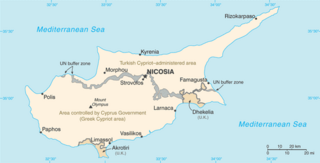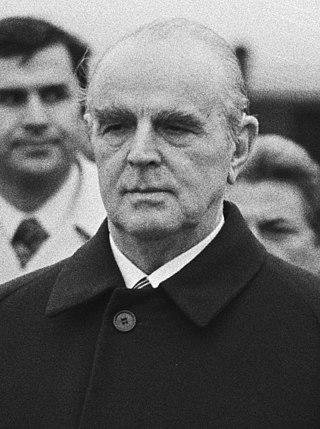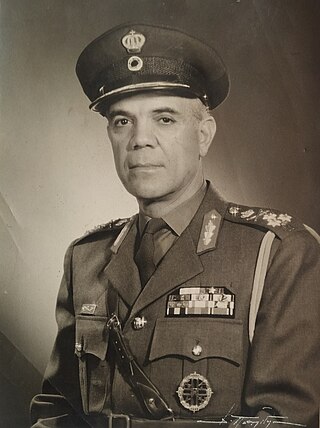Related Research Articles

The Cyprus problem, also known as the Cyprus conflict, Cyprus issue, Cyprus dispute, or Cyprus question, is an ongoing dispute between the Greek Cypriot community which runs the Republic of Cyprus and the Turkish Cypriot community in the north of the island, where troops of the Republic of Turkey are deployed. This dispute is an example of a protracted social conflict. The Cyprus dispute stems from a Turkish military invasion of the island after a coup, and the presence of Turkish soldiers despite a legal reinstatement of a stable government. Also some of the ethnic Turkish peoples' desire for the partition of the island of Cyprus through Taksim and mainland Turkish nationalists settling in as a show of force, as a supposed means of protection of their people by what they considered to be the threat of Greek-Cypriots.

Konstantinos G. Karamanlis was a Greek politician who was the four-time Prime Minister of Greece and two-term president of the Third Hellenic Republic. A towering figure of Greek politics, his political career spanned portions of seven decades, covering much of the latter half of the 20th century.

Makarios III was a Greek Cypriot archbishop, primate, statesman and politician who served as the first President of Cyprus between 1960 and July 1974, with a second term between December 1974 and 1977. He was also the Archbishop of the autocephalous Church of Cyprus from 1950 to 1977.

Efstathios "Tassos" Nikolaou Papadopoulos was a Cypriot politician and barrister, who served as President of Cyprus from 2003 to 2008.

Georgios Papadopoulos was a Greek military officer and dictator who led a coup d'etat in Greece in 1967 and became the country's Prime Minister from 1967 to 1973. He also was the President of Greece under the junta in 1973, following a referendum. However, after the effective suppression of the Athens Polytechnic uprising, he was, in turn, overthrown by hardliner Dimitrios Ioannidis, in a string of events that would culminate in the fall of the regime in 1974. His and the dictatorship's legacy, as well as its methods he constructed and effects on Greek economy and society as a whole, are still fiercely debated.

Odysseus Aggelis was a Greek nationalist military officer of the Artillery [Reg. Number 19386]. He reached the rank of four star General and served as Chief of the Greek Armed Forces and Vice President of the Hellenic Republic. He supported the military regime that was established on April 21, 1967.

Middle East Command, later Middle East Land Forces, was a British Army Command established prior to the Second World War in Egypt. Its primary role was to command British land forces and co-ordinate with the relevant naval and air commands to defend British interests in the Middle East and eastern Mediterranean region.

The Greek junta or Regime of the Colonels was a right-wing military junta that ruled Greece from 1967 to 1974. On 21 April 1967, a group of colonels overthrew the caretaker government a month before scheduled elections which Georgios Papandreou's Centre Union was favoured to win.
The Metapolitefsi was a period in modern Greek history from the fall of the Ioannides military junta of 1973–74 to the transition period shortly after the 1974 legislative elections.

Giorgos Lillikas is a Cypriot politician. Following the election of Tassos Papadopoulos as president in 2003, Lillikas became minister of commerce and industry. He was subsequently the foreign minister from 2006 to 2007. He was an independent candidate at the 2013 Cypriot presidential election.

Vassos Lyssarides was a Cypriot politician and physician who was a central figure in the politics of Cyprus after the island's independence.

The following outline is provided as an overview of and topical guide to Cyprus:

Haji Bashir Ismail Yusuf, commonly referred to as Haji Bashir, was a Somali politician. He was a prominent Somali Youth League (SYL) member and the first President of the Somali National Assembly during the Somali Republic's early civilian administration.

Parliamentary elections were held in Cyprus in 1960. The House of Representatives was elected on 31 July 1960. The Communal Chambers were also elected on 7 August. In the House of Representatives 35 seats were elected by Greek Cypriots and 15 by Turkish Cypriots. The result was a victory for the Patriotic Front, which won 30 of the 50 seats. In the Communal Chambers, the Patriotic Front won the majority of seats in the Greek Chamber, whilst the Cyprus Turkish National Union won all seats in the Turkish Chamber.
Alieu Badara Njie was a Gambian statesman who served as the 3rd Vice-President of the Gambia from 1977 to 1981. He served as the first Gambian Ambassador to Senegal and in Dawda Jawara's first cabinet. He held several ministerial roles under Jawara and played a key role in securing Gambian independence. He was Minister of Foreign Affairs from 1965–1967 and 1974–77, Minister of Communications from 1960–1961 and 1963–1965, Minister of Works from 1962–1965, Minister of Information from 1970–1971, and Minister of Agriculture from 1972–1974.

Athanasios "Nasos" Ktorides is a Cypriot entrepreneur and philanthropist, founding Chairman and former CEO of the EuroAsia Interconnector electricity cable, Quantum Corporation, Quantum Energy, Quantum Cable and EuroAfrica Interconnector. He is first Cyprus Goodwill Ambassador for UNICEF.
By-elections were held in Cyprus on 25 September 1960 to fill four vacant seats in the 50-member House of Representatives. They were the first legislative by-elections ever held in the Republic of Cyprus. One candidate was elected unopposed, with voting only needed for three seats.
References
- ↑ Previous Ministers, Council of Ministers. Accessed 31 December 2020.
- ↑ Short Biographies of the President and the Vice-President of the Republic of Cyprus, President and the Vice-President of the House of Representatives, and of the Ministers, 1963, p.22.
- ↑ 'Who's Who in the Middle East and North Africa', The Middle East and North Africa 1965-66. Europa Publications, 1966, p.789.